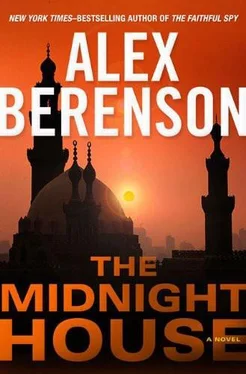Alex Berenson - The Midnight House
Здесь есть возможность читать онлайн «Alex Berenson - The Midnight House» весь текст электронной книги совершенно бесплатно (целиком полную версию без сокращений). В некоторых случаях можно слушать аудио, скачать через торрент в формате fb2 и присутствует краткое содержание. Жанр: Шпионский детектив, на английском языке. Описание произведения, (предисловие) а так же отзывы посетителей доступны на портале библиотеки ЛибКат.
- Название:The Midnight House
- Автор:
- Жанр:
- Год:неизвестен
- ISBN:нет данных
- Рейтинг книги:3 / 5. Голосов: 1
-
Избранное:Добавить в избранное
- Отзывы:
-
Ваша оценка:
- 60
- 1
- 2
- 3
- 4
- 5
The Midnight House: краткое содержание, описание и аннотация
Предлагаем к чтению аннотацию, описание, краткое содержание или предисловие (зависит от того, что написал сам автор книги «The Midnight House»). Если вы не нашли необходимую информацию о книге — напишите в комментариях, мы постараемся отыскать её.
The Midnight House — читать онлайн бесплатно полную книгу (весь текст) целиком
Ниже представлен текст книги, разбитый по страницам. Система сохранения места последней прочитанной страницы, позволяет с удобством читать онлайн бесплатно книгу «The Midnight House», без необходимости каждый раз заново искать на чём Вы остановились. Поставьте закладку, и сможете в любой момент перейти на страницу, на которой закончили чтение.
Интервал:
Закладка:
“Get up, Kuwaiti. If that’s what you are. Get dressed.”
Wells rolled out, pulled on a galabiya . The wiry man rousted the room, pulling open drawers, rooting through Wells’s toiletries kit, shining a flashlight under the bed, a cursory but efficient search. Wells watched in silence until the man reached the suitcase.
“It’s locked,” he said.
“Why?” Hani said.
“There’s a camera inside.”
“Open it.”
Wells extracted a key from his wallet and unlocked the case. The wiry man pulled out the video camera almost triumphantly.
“Why do you have this?” Hani said.
“To film the interviews.” Wells took a slightly aggravated tone, as if he could hardly be bothered to answer such a stupid question.
Hani held up Wells’s Rolex. “You’re a rich man, Kuwaiti. Why stay here? Why not the Hyatt, with your cousins?” The Cairo Grand Hyatt had paradoxically become the favorite of the Gulf Arabs who visited the city. Paradoxically, because Hyatt was owned by the Pritzker family, who were not just Americans but Jews.
“The Hyatt? So the mukhabarat can watch me come and go? Does that seem like a good idea, habibi? ”
“Stuff your mouth with sand and see if you make such smart remarks,” Hani murmured, to himself as much as to Wells. Again, his manner troubled Wells. A decade ago, in Afghanistan — and especially in the abattoir that was Chechnya — Wells had seen men who responded to any uncertainty with violence, the quicker and messier the better. Hani might be one of them. And yet he didn’t seem angry or volatile. Perhaps he didn’t want to be here, and the imam had forced the mission on him.
Hani pulled out his cell phone, typed a quick text, slipped it away. He tucked Wells’s passport and wallet into his jeans. “Time to go.”
“Where?” Wells wasn’t expecting an answer.
But he got one. “You wanted to meet Ihab Zumari, Kuwaiti? Now you will.”
OUTSIDE, A PEUGEOT 504 IDLED. A four-door sedan, boxy and black, with tinted windows. Hani ushered Wells into the back, tied a black bandanna over his eyes, tightly enough to ensure that light didn’t leak through.
Wells lay back, closed his eyes, tried to sleep. He wasn’t overly worried. Most likely the imam was just being cautious. And if not. he’d faced worse odds than this.
The car turned left, right, then accelerated. Even without the blindfold, Wells would have been lost.
“What’s your name, Kuwaiti?” Hani said.
“Nadeem Taleeb.”
“Where do you live?”
“Kuwait City.”
“And why are you here?”
“To interview Alaa Zumari. You know all this.”
“You’re a spy.”
“No more than you.”
The back of a hand stung his face.
“Be careful, Kuwaiti.”
Then Wells understood. The well-knotted blindfold. Hani’s two-handed pistol grip. His strangely relaxed attitude. He was no jihadi, however many years he’d spent at this mosque. He was mukhabarat. Very good, but not good enough to eliminate the traces of his training.
And he, even more than the imam, must be wondering what Nadeem Taleeb was doing here. Behind his blindfold, Wells puzzled through the permutations. The Egyptians couldn’t have penetrated his cover already. Cooperation between the Kuwaiti and Egyptian intelligence services was mediocre at best.
No. Hani didn’t know who Nadeem really was. His best move would be to play along, to hope that Nadeem could get him to Alaa Zumari. The Egyptians were embarrassed to have lost Zumari. Even if they didn’t want to arrest him, they surely wanted to find him again.
What about the imam? Did he know his deputy was an Egyptian agent? Could he be working for secret police, too? Wells guessed not, though he couldn’t be sure.
The car stopped. A hand tugged him out of the car. “Turn, facing the car,” Hani said. “Hands behind your back.” His voice was close. Wells smelled the coffee on his breath, the stink of his unwashed skin. Wells held out his hands, and Hani slipped handcuffs around his wrists and frog-marched him toward a second vehicle, a bigger one with a diesel engine.
“Two steps here,” Hani said.
As Wells reached the second step, Hani pushed him forward. He tripped, sprawled forward. With his hands cuffed behind him, he instinctively rolled onto his right shoulder to protect his face. Too late, he remembered that he should have rolled left. Two years before, he had separated his right shoulder, and then it had taken a terrible beating from two Chinese prison guards. He had rebuilt and strengthened the joint as best he could. Now he landed directly on it. It buckled up and came out of the socket with an audible pop, and Wells felt as if the joint were being prodded with a hot iron.
Through the pain, Wells remembered that Nadeem Taleeb had to swear in Arabic. “Sharmuta, sharmuta,” he said. The word roughly translated as “bitch.”
Wells squirmed onto his left side, trying to relieve the pressure on his shoulder. The handcuffs worsened the pain, pulling his arm down and out of the socket. His breaths were coming fast and shallow, and he didn’t know how long he could stay conscious.
Someone tugged off the blindfold. Wells found himself looking up at the imam.
“Are you all right, Kuwaiti?”
“The handcuffs—”
“Take them off,” the imam said to Hani.
Hani hesitated, then reached for the cuffs, giving Wells’s shoulder a final tug as he did. With his arms free, the pain was merely agonizing. Wells sat up, his right arm hanging limp. He was in a midsize panel truck. The imam and Hani sat beside him, a skinny middle-aged man in the corner. His hair was gray, unusual for an Arab. Wells recognized him from Alaa Zumari’s dossier. Alaa’s father, Ihab.
“Pop it in,” Wells said to Hani.
“What?”
“My shoulder.” Wells could fix the joint himself. He had before. But very few people had his pain tolerance, and they might wonder how he’d managed it.
Hani looked to the imam, who nodded. Hani grabbed Wells’s arm at the elbow and without hesitation pushed it up and into the socket. Wells’s body became a machine devoted to generating pain, the agony radiating across his chest. Then his arm settled in and Wells could open his eyes. He took two breaths, three, and then was able to move. He squirmed backward, leaned against the side of the truck.
“You are all right?” the imam said.
“Inshallah,” Wells said.
“Inshallah.”
Hani gave the imam Wells’s Kuwaiti passport and wallet. The imam leafed through them. “You came to Suez. Why not fly?”
“At the airport, every passenger is photographed. It’s best for me if my picture isn’t taken. The pharaoh’s men are everywhere.”
“That man”—the imam nodded at the man in the corner—“is Ihab Zumari. The one you’ve come to see.”
Wells braced himself to stand, but Hani put a hand on his left shoulder. “ Salaam alekeim, Ihab,” Wells said.
“Alekeim salaam.”
“I’m Nadeem Taleeb. I’m sorry to disturb your sleep.”
Zumari nodded.
“Did you see my Web site? The videos?”
Another nod.
“Then you know why I’ve come to you.”
“Tell me,” Zumari said. His voice was low, each syllable measured. His dossier said he ran a small electronics store in a run-down section of Islamic Cairo, but he looked and sounded more like a law professor.
“I want to talk to your son. Interview him.”
“Why Alaa? It must be thousands of detainees who’ve been released.”
“Only a few from the secret prisons.”
Neither Zumari nor the imam looked convinced.
“You wonder why I do this. I’ll tell you about myself. I’m not a jihadi. I pray, sure, but I never hated the Kaffirs. Back in the 1990s, I lived in France. I liked it. But five years ago, a boy I know, a friend’s son, Ali, he went to Afghanistan. He wasn’t really a jihadi. Not very religious. He went with the Talibs for the adventure, I think.”
Читать дальшеИнтервал:
Закладка:
Похожие книги на «The Midnight House»
Представляем Вашему вниманию похожие книги на «The Midnight House» списком для выбора. Мы отобрали схожую по названию и смыслу литературу в надежде предоставить читателям больше вариантов отыскать новые, интересные, ещё непрочитанные произведения.
Обсуждение, отзывы о книге «The Midnight House» и просто собственные мнения читателей. Оставьте ваши комментарии, напишите, что Вы думаете о произведении, его смысле или главных героях. Укажите что конкретно понравилось, а что нет, и почему Вы так считаете.












